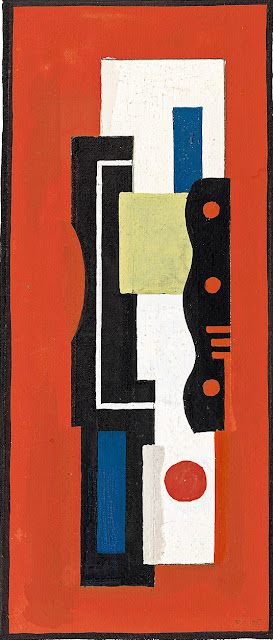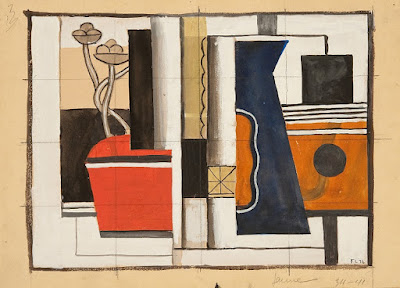 |
| Fernand Léger The Lamp 1913 gouache. ink and graphite on paper Hirshhorn Museum, Washington DC |
 |
| Fernand Léger The Stove 1918 oil on canvas Guggenheim Museum, New York |
 |
| Fernand Léger Woman in Front of the Window 1923 oil on canvas Los Angeles County Museum of Art |
 |
| Fernand Léger Study for The Creation of the Earth 1923 tempera and watercolor on paper Hirshhorn Museum, Washington DC |
 |
| Fernand Léger Mural Painting 1924-25 oil on canvas Guggenheim Museum, New York |
 |
| Fernand Léger Composition 1925 oil on canvas Guggenheim Museum, New York |
 |
| Fernand Léger Composition 1926 gouache on paper Guggenheim Museum, New York |
 |
| Fernand Léger Still Life with Pot of Flowers 1926 gouache and graphite on paper Hirshhorn Museum, Washington DC |
 |
| Fernand Léger Woman holding a Vase 1927 oil on canvas Guggenheim Museum, New York |
-King-of-Diamonds-1927-oil-on-canvas-Hirshhorn-Museum-Washington-DC.jpg) |
| Fernand Léger Still Life: King of Diamonds 1927 oil on canvas Hirshhorn Museum, Washington DC |
 |
| Fernand Léger Nude on Red Background 1927 oil on canvas Hirshhorn Museum, Washington DC |
 |
| Fernand Léger Study for Decoration at Radio City, New York 1938 gouache on paper Hirshhorn Museum, Washington DC |
 |
| Fernand Léger Divers against Black 1941 oil on canvas Walker Art Center, Minneapolis |
-Washington-DC.jpg) |
| Fernand Léger France Reborn 1945 watercolor, gouache and graphite on paper Smithsonian American Art Museum, Washington DC |
 |
| Fernand Léger Builders with Rope 1950 oil on canvas Guggenheim Museum, New York |
 |
| Fuller Fabrics, New York Vitrail (designed by Fernand Léger) 1955 printed cotton Cooper-Hewitt Smithsonian Design Museum, New York |
 |
| Claire McCardell Shirtwaist Dress (circus print designed by Fernand Léger for Fuller Fabrics) 1955 printed cotton Cooper-Hewitt Smithsonian Design Museum, New York |
Ode Fourteen (Book Two)
You can't grip years, Posthume,
that ripple away nor hold back
wrinkles and, soon now, age,
nor can you tame death,
not if you paid three hundred
bulls every day that goes by
to Pluto, who has no tears,
who has dyked up
giants where we'll go aboard,
we who feed on the soil,
to cross, kings some, some
penniless plowmen.
For nothing we keep out of war
or from screaming spindrift
or wrap ourselves against autumn,
for nothing, seeing
we must stare at that dark, slow
drift and watch the damned
toil while all they build
tumbles back on them.
We must let earth go and home,
wives too, and your trim trees,
yours for a moment, save one
sprig of black cypress.
Better men will employ
bottles we locked away,
wine puddles our table,
fit wine for a pope.
– Horace (65-8 BC), translated by Basil Bunting (1970)